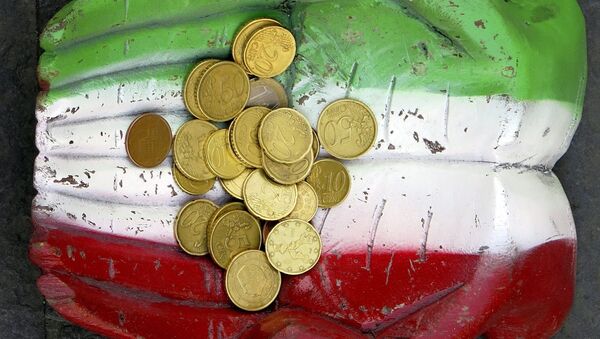Matteo Renzi's resignation as prime minister triggered speculation about Italy's relationship with the euro, amid reports new elections could bring the anti-establishment 5 Star Movement to power — a party that has called for a referendum on whether Italy should keep the euro.
Despite this instability, finance ministers from across the Eurozone moved to quell fears that Italy could tumble out of the currency union and cause a euro crisis.
No win in referendum will trigger banking crisis in Italy. Expect USD to make significant gains on euro. #italyreferendum
— Constantinus Magnus (@ConstantinusMag) December 4, 2016
"It doesn't really change the situation economically in Italy or in the Italian banks," said Eurogroup head Jeroen Dijsselbloem, who is also the Dutch finance minister.
"The problems that we have today are the problems that we had yesterday."
German Finance Minister Wolfgang Schaeuble echoed Dijsselbloem's sentiment.
"There is no reason to talk about a euro crisis… I think we have to take this with a dose of serenity," he said, adding that despite not being hugely concerned about the situation: "Italy urgently needs a government that is ready to act."
German response to Renzi resignation: no reason for a euro crisis. Fin Min Schaeuble declared 'we should be relaxed on Italy.' #Italy
— Gavin Hewitt (@BBCGavinHewitt) December 5, 2016
And it wasn't just politicians playing down the risk of a euro crisis, with Vincenzo Emanuele, adjunct professor of the Italian Political System at LUISS Guido Carli in Rome telling Sputnik that it was unlikely the country would exit the Eurozone.
"Italy is one of the countries with the highest private savings in the world. So people would put these savings at risk if we would exit the Eurozone. The remain option is the most likely one," he said.
Italy: 30 Percent Chance of Staying in the Euro
Despite the optimism from political figures and some analysts, others have remained cautious, warning that the situation in Italy could threaten the European single currency.
"The risks of a new political instability for economic development, the financial markets and the currency union are increasing further," said Ulrich Grillo, the head of the Federation of German Industries (BDI).
#Italy FinancialTimes,Gideon Rachman;"Renzi's defeat could set off a chain of events the endanger the euro & unleash a financial crisis."
— Paul Patrick (@PaulTyredagh81) December 6, 2016
Even more damning was analysis from leading economic consultants the Centre for Economics and Business Research (CEBR), who gave Italy a less than 30 percent chance of remaining in the euro over the next five years.
The CEBR said the defiant referendum result, which rejected Renzi's plans to reshape the Italian Senate by a larger than expected 20 point margin, was an indication many Italians would not accept the negative effects of euro membership.
Italy's prob staying in euro for another 5 years down to 30%. ECB stops immediate crisis but voters will reject another 5-10 yrs austerity
— Douglas McWilliams (@DMcWilliams_UK) December 5, 2016
"There is no doubt that Italy could stay in the euro if it were prepared to pay the price of virtually zero growth and depressed consumer spending for another 5 years or so," the group said in a note.
"But that is asking a lot of an increasingly impatient electorate. We think the chances of their sustaining this policy are below 30 per cent."
There is still uncertainty over who will lead Italy following Renzi's resignation, and whether new elections will be held, with Interior Minister Angelino Alfano predicting new polls could be held in February.


